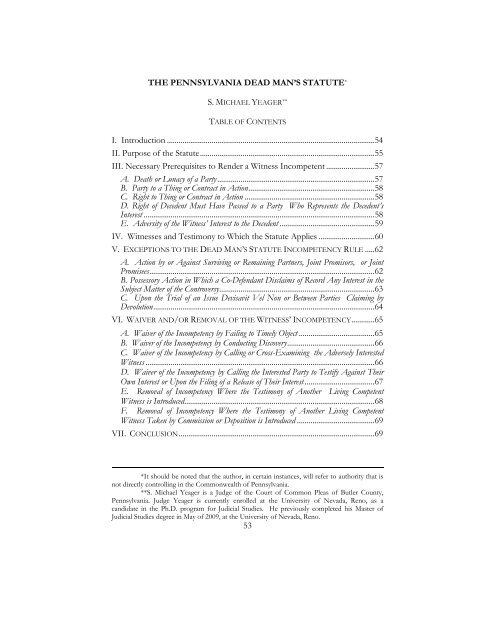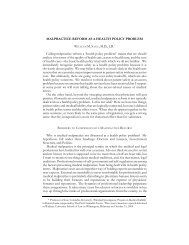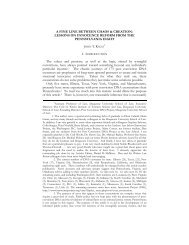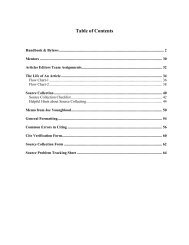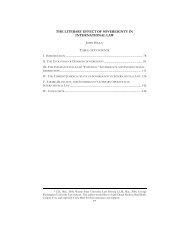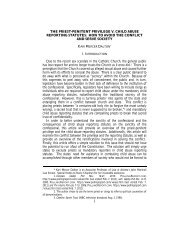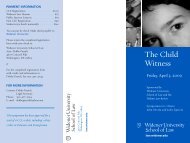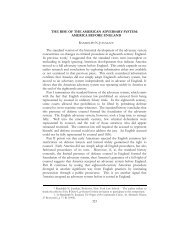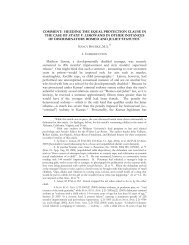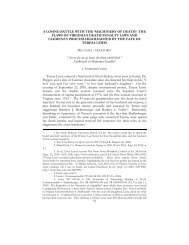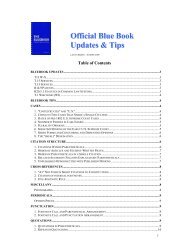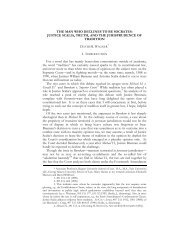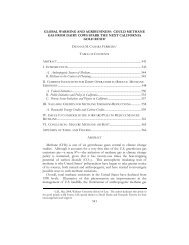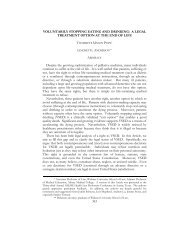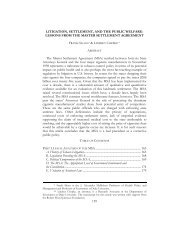The Pennsylvania Dead Man's Statute - Widener Law Review
The Pennsylvania Dead Man's Statute - Widener Law Review
The Pennsylvania Dead Man's Statute - Widener Law Review
You also want an ePaper? Increase the reach of your titles
YUMPU automatically turns print PDFs into web optimized ePapers that Google loves.
THE PENNSYLVANIA DEAD MAN’S STATUTE *<br />
S. MICHAEL YEAGER * *<br />
TABLE OF CONTENTS<br />
I. Introduction ...........................................................................................................54<br />
II. Purpose of the <strong>Statute</strong> ..........................................................................................55<br />
III. Necessary Prerequisites to Render a Witness Incompetent .........................57<br />
A. Death or Lunacy of a Party .................................................................................57<br />
B. Party to a Thing or Contract in Action .................................................................58<br />
C. Right to Thing or Contract in Action ...................................................................58<br />
D. Right of Decedent Must Have Passed to a Party Who Represents the Decedent’s<br />
Interest .......................................................................................................................58<br />
E. Adversity of the Witness’ Interest to the Decedent .................................................59<br />
IV. Witnesses and Testimony to Which the <strong>Statute</strong> Applies .............................60<br />
V. EXCEPTIONS TO THE DEAD MAN’S STATUTE INCOMPETENCY RULE .....62<br />
A. Action by or Against Surviving or Remaining Partners, Joint Promisors, or Joint<br />
Promisees ....................................................................................................................62<br />
B. Possessory Action in Which a Co-Defendant Disclaims of Record Any Interest in the<br />
Subject Matter of the Controversy ................................................................................63<br />
C. Upon the Trial of an Issue Devisavit Vel Non or Between Parties Claiming by<br />
Devolution ..................................................................................................................64<br />
VI. WAIVER AND/OR REMOVAL OF THE WITNESS’ INCOMPETENCY ............65<br />
A. Waiver of the Incompetency by Failing to Timely Object .......................................65<br />
B. Waiver of the Incompetency by Conducting Discovery .............................................66<br />
C. Waiver of the Incompetency by Calling or Cross-Examining the Adversely Interested<br />
Witness ......................................................................................................................66<br />
D. Waiver of the Incompetency by Calling the Interested Party to Testify Against <strong>The</strong>ir<br />
Own Interest or Upon the Filing of a Release of <strong>The</strong>ir Interest ....................................67<br />
E. Removal of Incompetency Where the Testimony of Another Living Competent<br />
Witness is Introduced ..................................................................................................68<br />
F. Removal of Incompetency Where the Testimony of Another Living Competent<br />
Witness Taken by Commission or Deposition is Introduced ........................................69<br />
VII. CONCLUSION .....................................................................................................69<br />
*It should be noted that the author, in certain instances, will refer to authority that is<br />
not directly controlling in the Commonwealth of <strong>Pennsylvania</strong>.<br />
**S. Michael Yeager is a Judge of the Court of Common Pleas of Butler County,<br />
<strong>Pennsylvania</strong>. Judge Yeager is currently enrolled at the University of Nevada, Reno, as a<br />
candidate in the Ph.D. program for Judicial Studies. He previously completed his Master of<br />
Judicial Studies degree in May of 2009, at the University of Nevada, Reno.<br />
53
54 <strong>Widener</strong> <strong>Law</strong> <strong>Review</strong> [Vol. 18: 53<br />
I. INTRODUCTION<br />
<strong>The</strong> trepidation about the <strong>Pennsylvania</strong> <strong>Dead</strong> Man’s <strong>Statute</strong> that I had<br />
always experienced as a practicing attorney and still experience as a judge was<br />
substantially increased upon my receipt of a memorandum dated May 23,<br />
2005, from the President Judge of the county in which I preside. As a result<br />
of this correspondence, “informal division assignments effective January 1,<br />
2006” were implemented. 1 I was assigned to handle forty percent of the Civil<br />
Division (excluding Family Court), including all license suspensions, and all<br />
estate and trust matters in the Orphans’ Court Division.<br />
Through my previous experience, I was well aware that of all the areas of<br />
law, the <strong>Dead</strong> Man’s <strong>Statute</strong> is most likely to apply in estate matters because<br />
many states have specifically enacted such statutes to handle claims against an<br />
estate. 2 In <strong>Pennsylvania</strong>, lawyers and judges have struggled with “<strong>The</strong> <strong>Dead</strong><br />
Man’s Act” since its inception. 3<br />
<strong>The</strong> <strong>Dead</strong> Man’s <strong>Statute</strong> in <strong>Pennsylvania</strong> consists of a single sentence<br />
containing more than three hundred words, constructed as a triple negative,<br />
delineating when a surviving or remaining party to a “thing or contract in<br />
action” may or may not testify, and is a part of the substantive law of the<br />
Commonwealth. 4 It “applies to civil proceedings before any tribunal in the<br />
Commonwealth,” be it the “register of wills, auditor, arbitrator, referee, court<br />
of common pleas, orphans’ court division of the same, the Superior Court, the<br />
Supreme Court, or any other tribunal created by law to try causes of action<br />
between contesting parties.” 5 <strong>The</strong> <strong>Statute</strong>, entitled “Surviving party as a<br />
witness, in case of death, mental incapacity, etc.,” reads as follows:<br />
Except as otherwise provided in this subchapter, in any civil action or<br />
proceeding, where any party to a thing or contract in action is dead, or has been<br />
adjudged a lunatic and his right thereto or therein has passed, either by his own<br />
act or by the act of the law, to a party on the record who represents his interest<br />
in the subject in controversy, neither any surviving or remaining party to such<br />
thing or contract, nor any other person whose interest shall be adverse to the<br />
said right of such deceased or lunatic party, shall be a competent witness to any<br />
matter occurring before the death of said party or the adjudication of his lunacy,<br />
unless the action or proceeding is by or against the surviving or remaining<br />
partners, joint promisors or joint promisees, of such deceased or lunatic party,<br />
and the matter occurred between such surviving or remaining partners, joint<br />
promisors or joint promisees and the other party on the record, or between<br />
such surviving or remaining partners, promisors or promisees and the person<br />
1. Memorandum from Thomas J. Doerr, President Judge, Butler Cnty. Court of<br />
Common Pleas, to Judge George H. Hancher, Judge Marilyn J. Horan, Judge William R. Shaffer,<br />
and Judge S. Michael Yeager (May 23, 2005) (on file with the <strong>Widener</strong> <strong>Law</strong> <strong>Review</strong>).<br />
2. Steve Planchon, Comment, <strong>The</strong> Application of the <strong>Dead</strong> Man’s <strong>Statute</strong>s in Family <strong>Law</strong>,<br />
16 J. AM. ACAD. MATRIMONIAL L. 561, 566 (2000).<br />
3. Burton R. Laub, & John M. McLaughlin, <strong>The</strong> <strong>Dead</strong> Man’s Act, in 3 PENNSYLVANIA<br />
KEYSTONE LAWYER’S DESK LIBRARY OF PRACTICE 5, 7 (W. Edward Sell ed., Supp. 2011). <strong>The</strong><br />
<strong>Dead</strong> Man’s Act can be found in Section 5, Clause (e) of the Evidence Act of May 23, 1887. Id.<br />
4. 42 PA. CONS. STAT. ANN. § 5930 (West 2000).<br />
5. 53 PA. L. ENCY. 2D Witnesses § 62 (2d ed. 2006).
2012] <strong>Pennsylvania</strong> <strong>Dead</strong> Man’s <strong>Statute</strong> 55<br />
having an interest adverse to them, in which case any person may testify to such<br />
matters; or, unless the action is a possessory action against several defendants,<br />
and one or more of said defendants disclaims of record any title to the premises<br />
in controversy at the time the suit was brought and also pays into court the<br />
costs accrued at the time of his disclaimer, or gives security therefor as the court<br />
in its discretion may direct, in which case such disclaiming defendant shall be a<br />
fully competent witness; or, unless the issue or inquiry be devisavit vel non, or<br />
be any other issue or inquiry respecting the property of a deceased owner, and<br />
the controversy is between parties respectively claiming such property by<br />
devolution on the death of such owner, in which case all persons shall be fully<br />
competent witnesses. 6<br />
<strong>Pennsylvania</strong>’s <strong>Dead</strong> Man’s <strong>Statute</strong> is in contravention of the general<br />
statutory rule embodied in title 42, section 5921 of the <strong>Pennsylvania</strong><br />
Consolidated <strong>Statute</strong>s (any interest in a civil matter does not render a person<br />
incompetent to be a witness in the case), and is likewise an exception to Rule<br />
601 of the <strong>Pennsylvania</strong> Rules of Evidence (the presumption that all witnesses<br />
are competent to testify). 7 In fact, the Comment to Rule 601 acknowledges<br />
that “<strong>Pennsylvania</strong> statutory law provides several instances in which witnesses<br />
are incompetent” with title 42, section 5930 of the <strong>Pennsylvania</strong> Consolidated<br />
<strong>Statute</strong>s being one of those circumstances, 8 as the Rules of Evidence cannot<br />
abrogate statutes. <strong>The</strong> <strong>Statute</strong> applies to any civil action or proceeding where<br />
any party is dead, or has been judicially determined to be a lunatic, and subject<br />
to certain exceptions, renders any remaining party to the matter at issue in the<br />
action or any witness whose interest is adverse to the protected party<br />
incompetent to testify regarding any matter occurring before the death of the<br />
decedent or adjudication of lunacy, as the case may be. 9<br />
II. PURPOSE OF THE STATUTE<br />
Under the common law, parties and interested persons were not competent<br />
witnesses, no matter the purpose. 10 <strong>The</strong> courts devised the <strong>Dead</strong> Man’s<br />
<strong>Statute</strong> because, in their collective minds, “the fallen nature of man was<br />
incapable of the truth where self interest was involved.” 11 Those same courts,<br />
however, were not concerned that the rule could also inhibit truth, thus giving<br />
unjust individuals the chance to avoid the payment of proper indebtednesses. 12<br />
In response to these judicial concerns, “the legislature sought to prevent the<br />
injustice that might [otherwise] flow from permitting a surviving, adverse party<br />
to give testimony that is favorable to himself and unfavorable to the<br />
decedent’s interest, but which the decedent’s representative is in no position to<br />
(1879)).<br />
6. 42 PA. CONS. STAT. ANN. § 5930 (emphasis added).<br />
7. Id. § 5921; PA. R. EVID. 601(a).<br />
8. PA. R. EVID. 601 committee’s cmt. (2007).<br />
9. 42 PA. CONS. STAT. ANN. § 5930.<br />
10. Laub & McLaughlin, supra note 3, at 8 (citing Hess v. Gourley, 89 Pa. 195, 198<br />
11. Laub & McLaughlin, supra note 3, at 8.<br />
12. Id.
56 <strong>Widener</strong> <strong>Law</strong> <strong>Review</strong> [Vol. 18: 53<br />
rebut.” 13 <strong>The</strong> testimony is rejected because of the incompetency of the<br />
witness, not the testimony itself; the testimony may be completely relevant, yet<br />
inadmissible. 14 As stated by the Indiana Court of Appeals, the premise behind<br />
that State’s <strong>Dead</strong> Man’s Act is, quite succinctly, “when the lips of one party . . .<br />
are closed by death, the lips of the other party are closed by law.” 15<br />
In order to ensure a fair trial when one of the parties is deceased or has<br />
been adjudged a lunatic, and is thus unable to testify on his or her own behalf,<br />
the <strong>Dead</strong> Man’s <strong>Statute</strong> protects that party’s estate from fraudulent claims and<br />
equalizes the respective positions of the parties relative to the presentation of<br />
testimony. 16 <strong>The</strong> underlying purposes of the <strong>Dead</strong> Man’s <strong>Statute</strong> are equality,<br />
the prevention of false testimony, 17 and to put the surviving party on equal<br />
ground with the protected party’s representative with regards to matters that<br />
occurred during the decedent’s lifetime or prior to an adjudication of lunacy. 18<br />
By prohibiting a person from testifying as a witness to establish his or her own<br />
claim or defense against the estate of the protected party which originated<br />
prior to death or adjudged lunacy, the statute effectively renders incompetent<br />
an interested person’s testimony regarding conversations and events that<br />
occurred in the presence of the deceased or adjudged lunatic. 19<br />
It is of interest to note that pursuant to Federal Rule of Evidence 601,<br />
“[e]very person is competent to be a witness except as otherwise provided in<br />
these rules.” 20 <strong>The</strong> Advisory Committee’s Note on Rule 601 states: “<strong>The</strong><br />
<strong>Dead</strong> Man’s Acts are surviving traces of the common law disqualification of<br />
parties and interested persons. <strong>The</strong>y exist in variety too great to convey<br />
conviction of their wisdom and effectiveness. <strong>The</strong>se rules contain no<br />
provision of this kind.” 21<br />
Federal Rule of Evidence 601 continues: “However, in civil actions and<br />
proceedings, with respect to an element of a claim or defense as to which State<br />
law supplies the rule of decision, the competency of a witness shall be<br />
determined in accordance with State law.” 22 Accordingly, state <strong>Dead</strong> Man’s<br />
<strong>Statute</strong>s are applicable in diversity actions, 23 but not in federal question cases. 24<br />
Competency is the general rule, and the <strong>Dead</strong> Man’s <strong>Statute</strong> is a limited<br />
exception that is to be narrowly construed in its application by the courts. 25 It<br />
should not be extended by implication or to cases not strictly within the terms<br />
13. Schroeder v. Jaquiss, 861 A.2d 885, 889 (Pa. 2004).<br />
14. 53 PA. L. ENCY., supra note 5, at § 61.<br />
15. Satterthwaite v. Estate of Satterthwaite, 420 N.E.2d 287, 289 (Ind. Ct. App. 1981).<br />
16. See Ruback v. Doss, 807 N.E.2d 1019, 1022 (Ill. App. Ct. 2004).<br />
17.See Montgomery Cnty. v. Herlihy, 575 A.2d 784, 789-90 (Md. Ct. Spec. App. 1990).<br />
18. J.M. Corp. v. Roberson, 749 N.E.2d 567, 571 (Ind. Ct. App. 2001).<br />
19. Estate of Deskins v. Deskins, 471 N.E.2d 1018, 1025 (Ill. App. Ct. 1984).<br />
20. FED. R. EVID. 601.<br />
21. FED. R. EVID. 601 advisory committee’s note.<br />
22. FED. R. EVID. 601.<br />
23. E.g, Chase v. Groff, 410 F.Supp. 602, 608-09 (E.D. Pa. 1976), aff’d, 556 F.2d 565<br />
(3d Cir. 1977).<br />
24. Cf., United States v. Diehl, 460 F. Supp. 1282, 1289 (S.D. Tex. 1978), aff’d, 586<br />
F.2d 1080 (5th Cir. 1978).<br />
25. Germann v. Matriss, 260 A.2d 825, 838 (N.J. 1970).
2012] <strong>Pennsylvania</strong> <strong>Dead</strong> Man’s <strong>Statute</strong> 57<br />
of the statute. 26 Practitioners, however, believe that judges and/or arbitration<br />
panels often interpret the <strong>Statute</strong>’s reach as broader than it was intended<br />
because of the confusing language within the <strong>Statute</strong> itself. 27 <strong>The</strong><br />
<strong>Pennsylvania</strong> Superior Court has opined that, in criminal prosecutions, the<br />
<strong>Dead</strong> Man’s Act has no apparent basis for being imposed. 28<br />
III. NECESSARY PREREQUISITES TO RENDER A WITNESS INCOMPETENT<br />
Before a witness may be disqualified under the <strong>Dead</strong> Man’s <strong>Statute</strong>, six<br />
elements must exist. Although most of the literature describes only three<br />
necessary prerequisites, 29 the following delineation of six requirements is<br />
preferable for the purposes of clarity and completeness. <strong>The</strong> six elements are:<br />
(1) the deceased must have been a party to a thing or contract in his lifetime, (2)<br />
the thing or contract must be the subject of the controversy involved in the<br />
pending suit, (3) the deceased must have had an interest in the thing or contract,<br />
(4) the interest of the deceased must have passed, either by his own act or by<br />
the act of the law, to a party on the record in the pending suit who must<br />
represent such interest of the deceased in said suit, (5) the witness must have<br />
been the surviving party to such thing or contract or have an interest therein<br />
adverse to the interest of the deceased, and (6) the subject matter of the witness’<br />
proposed testimony must relate to matters occurring in the lifetime of the<br />
deceased. 30<br />
A. Death or Lunacy of a Party<br />
I hasten to point out that the <strong>Dead</strong> Man’s <strong>Statute</strong> applies also in cases<br />
where a party to a civil proceeding has been adjudged a lunatic. 31 As a<br />
practical matter, however, it appears that the <strong>Statute</strong> applies only when a party<br />
is deceased, because there is no provision under current law to adjudicate a<br />
person a lunatic. Current law permits the appointment of a guardian for an<br />
“incapacitated person;” however, the term “lunatic” is not referenced. 32 An<br />
adjudication of incompetency does not constitute an adjudication of lunacy<br />
and does not make the individual incompetent as a witness. 33<br />
In <strong>Pennsylvania</strong>,<br />
lunacy is an outdated legal criterion that is no longer adjudicated;<br />
consequently, this standard should be reconsidered by the Legislature. For<br />
this reason, I have referred to a deceased individual or decedent in the above<br />
referenced prerequisites and have omitted any reference to an adjudicated<br />
26. Germann, 260 A.2d at 838.<br />
27. See Terence P. Ruf, Jr., <strong>The</strong> Applicability of <strong>The</strong> <strong>Dead</strong> Man’s Act on Typical Litigation<br />
Matters, TERENCERUFLAW.COM, http://www.terenceruflaw.com/uploads/<strong>Dead</strong>_Mans_<br />
Article02.pdf (last visited December 20, 2011).<br />
28. Commonwealth v. DiCio, 275 A.2d 868, 870 (Pa. Super. Ct. 1971).<br />
29. E.g., id.<br />
30. Gelbarth v. Moore, 29 Del. Cnty. Rep. 68, 70-71 (Pa. Ct. Com. Pl. 1939).<br />
31. 42 PA. CONS. STAT. ANN. § 5930 (West 2000).<br />
32. 20 PA. CONS. STAT. ANN. § 5511 (West 2005).<br />
33. See Yacabonis v. Gilvickas, 101 A.2d 690, 692 (Pa. 1954).
58 <strong>Widener</strong> <strong>Law</strong> <strong>Review</strong> [Vol. 18: 53<br />
lunatic, although it is proper to substitute “adjudged a lunatic” for “deceased”<br />
in the six prerequisites, as well as throughout the paper.<br />
B. Party to a Thing or Contract in Action<br />
<strong>The</strong> <strong>Pennsylvania</strong> Supreme Court has held that the <strong>Dead</strong> Man’s <strong>Statute</strong><br />
applies to both contract actions and tort actions, being as the <strong>Statute</strong> makes no<br />
distinction regarding the types of civil cases to which it has applicability. 34<br />
Accordingly, the <strong>Dead</strong> Man’s <strong>Statute</strong> is operative in all types of civil cases.<br />
C. Right to Thing or Contract in Action<br />
In order for the <strong>Dead</strong> Man’s <strong>Statute</strong> to apply, the decedent must have had<br />
“an actual right or interest in the matter at issue, that is, an interest in the<br />
immediate result” of the litigation. 35 <strong>The</strong> burden of proving the interest of the<br />
decedent is upon the deceased party’s representative and requires only proof<br />
of a prima facie interest. 36 As stated above, the <strong>Statute</strong> is equally applicable in<br />
tort actions and is implemented even in cases where the plaintiff offers to limit<br />
his claim to the amount of liability insurance coverage and does not seek to<br />
obtain a deficiency judgment in excess thereof against the assets of the estate<br />
of the deceased defendant. 37<br />
D. Right of Decedent Must Have Passed to a Party<br />
Who Represents the Decedent’s Interest<br />
To create a bar to testimony by a person surviving the decedent under the<br />
<strong>Dead</strong> Man’s <strong>Statute</strong>, the decedent’s interest or right in the thing or contract in<br />
action must have passed to a party on the record that represents the decedent’s<br />
interest in the matter. 38 Generally, a decedent’s rights pass to his legal<br />
representative or heirs upon his death. 39 It is the legal representative or heir<br />
who is the party that may then assert the <strong>Dead</strong> Man’s <strong>Statute</strong> to protect the<br />
decedent’s estate. 40<br />
When a question arises regarding the validity of a transfer by the decedent<br />
prior to death, the court determines if a valid inter vivos transfer can be proven<br />
by independent evidence before it admits testimony by the purported donee. 41<br />
If the court establishes that a valid inter vivos transfer has occurred based upon<br />
such independent evidence, the donee, representing the interest of the<br />
deceased, is permitted to testify. 42 However, if the alleged donee cannot<br />
34. Irwin v. Nolde, 30 A. 246, 246 (Pa. 1894).<br />
35. In re Estate of Hall, 535 A.2d 47, 53 (Pa. 1987) (citation omitted).<br />
36. In re Estate of Rider, 409 A.2d 397, 399-400 (Pa. 1979).<br />
37. Lyons v. Estate of Bodek, 142 A.2d 199, 200 (Pa. 1958).<br />
38. Williams v. Lukas, 103 A.2d 675, 678 (Pa. 1954).<br />
39. See In re Estate of Cecchine, 485 A.2d 454, 457 (Pa. Super. Ct. 1984).<br />
40. See Weschler v. Carroll, 578 A.2d 13, 16-17 (Pa. Super. Ct. 1990).<br />
41. Friedman v. Kinnen, 305 A.2d 3, 4 (Pa. 1973).<br />
42. Id.
2012] <strong>Pennsylvania</strong> <strong>Dead</strong> Man’s <strong>Statute</strong> 59<br />
establish a prima facie gift by independent evidence, he will be deemed<br />
incompetent and thus not be permitted to testify. 43 If the gift is not prima<br />
facie valid, the right of the decedent passes to his estate, and, therefore, the<br />
alleged donee becomes an adverse party. 44 Should the donee establish a prima<br />
facie valid transfer or gift, any party with an interest adverse to the decedent’s<br />
transfer will be incompetent to testify. 45<br />
In a wrongful death action, the plaintiff is not suing for damages suffered<br />
by the decedent, and therefore is not representing the decedent’s interest;<br />
accordingly, the defendant tortfeasor is not barred by the <strong>Dead</strong> Man’s <strong>Statute</strong><br />
from testifying as to the circumstances of the accident. 46 However, a<br />
decedent’s interest passes to the personal representative of his estate for<br />
purposes of the survival action and the <strong>Statute</strong> thus applies to the survival<br />
action. 47 Notwithstanding the aforementioned, where the action involves<br />
claims under both the wrongful death and survival statutes, the <strong>Dead</strong> Man’s<br />
<strong>Statute</strong> is inapplicable, as it would be senseless to tell the jury to listen to the<br />
defendant tortfeasor in the wrongful death claim but not in the survival action<br />
claim. 48<br />
E. Adversity of the Witness’ Interest to the Decedent<br />
A witness’ interest must be adverse to that of the decedent in order for the<br />
witness to be incompetent under the <strong>Dead</strong> Man’s <strong>Statute</strong>. 49 As stated by the<br />
<strong>Pennsylvania</strong> Supreme Court, “[i]n order to be adverse the interest must be<br />
one from which the witness will either gain or lose as the direct legal operation<br />
and effect of the judgment.” 50 Additionally, the court has noted, “[t]he mere<br />
fact that a witness, for personal reasons, may be unfriendly to the decedent’s<br />
cause and partial to that of his adversary is wholly immaterial, for, while that<br />
circumstance may affect his credibility, it has nothing whatever to do with his<br />
competency.” 51 It is adverse interest, not adverse testimony, that disqualifies<br />
the proffered witness, 52 and it is the adversity of the witness’ interest at the<br />
time he or she is called to testify that is determinative of competency. 53 A<br />
witness who seeks to testify favorably to the interest of the decedent is<br />
deemed to be competent under the <strong>Statute</strong>. 54<br />
Questions regarding the existence of an adverse interest appear in situations<br />
where the parties have some type of relationship. <strong>The</strong> <strong>Pennsylvania</strong> Supreme<br />
43. Friedman, 305 A.2d at 4.<br />
44. In re Estate of Hendrickson, 130 A.2d 143, 147 (Pa. 1957).<br />
45. See Philo v. Rought, 123 A.2d 168, 170 (Pa. 1956).<br />
46. Dennick v. Scheiwer, 113 A.2d 318, 319 (Pa. 1955).<br />
47. Cf. Gibbs v. Herman, 714 A.2d 432, 436 (Pa. Super. Ct. 1998).<br />
48. Id.<br />
49. In re Estate of Hall, 535 A.2d 47, 53 (Pa. 1987).<br />
50. In re Estate of Gelb, 228 A.2d 367, 369 (Pa. 1967).<br />
51. Billow v. Billow, 61 A.2d 817, 819 (Pa. 1948) (citation omitted).<br />
52. In re Estate of Hall, 535 A.2d at 54 n.4 (citing In re Estate of Gelb, 228 A.2d at 369).<br />
53. See Estate of Kofsky, 409 A.2d 1358, 1359 (Pa. 1979).<br />
54. See Oliver v. Safe Deposit & Title Guar. Co., 173 A. 281, 283 (Pa. 1934).
60 <strong>Widener</strong> <strong>Law</strong> <strong>Review</strong> [Vol. 18: 53<br />
Court has reversed itself and now holds that the spouse of an incompetent<br />
witness is no longer rendered incompetent by the <strong>Dead</strong> Man’s <strong>Statute</strong>. 55 An<br />
agent or employee of an interested party who is disqualified under the <strong>Statute</strong><br />
is not likewise disqualified because of the employment or agency<br />
relationship. 56 Stockholders, as owners of a corporation, are disqualified by<br />
the <strong>Dead</strong> Man’s <strong>Statute</strong> if the corporation’s interest is adverse to that of the<br />
decedent’s estate, based upon the stockholders’ pecuniary interest. 57 However,<br />
the stockholder’s incompetency is removed if, after the action has been<br />
initiated, the stockholder has in good faith parted with the stock. 58 An officer<br />
of a corporation, if also a stockholder, is incompetent to testify due to an<br />
interest in the outcome of the litigation. 59 However, where an officer of a<br />
corporation is not a stockholder therein and not a party to the record, the<br />
officer is a competent witness under the <strong>Statute</strong> due to a lack of interest in the<br />
outcome of the litigation. 60 Officers, trustees, or members of charitable or<br />
religious organizations who have had dealings with an individual who<br />
subsequently passed away are competent to testify regarding conversations or<br />
transactions with such decedent, as they have no personal and/or private<br />
interest in the property of the organization. 61<br />
In family law, the <strong>Dead</strong> Man’s <strong>Statute</strong> is often implemented in the domain<br />
of common law marriages. By the very nature of such relationships, the<br />
testimony of the purported common law spouse is critical to establishing that<br />
a union in fact existed. Courts have repeatedly precluded such testimony<br />
when attempting to establish the status of a common law spouse in claims for<br />
a spousal elective share against the will of a decedent. This preclusion is based<br />
upon the principle that a common law marriage is a civil contract, and, as a<br />
result, the alleged spouse would be testifying to a contractual relationship<br />
between himself or herself and the decedent. 62 Likewise, testimony by a<br />
surviving spouse regarding a prenuptial or an antenuptial agreement is<br />
prohibited by the <strong>Statute</strong>, following the rationale of the common law marriage<br />
cases and viewing such agreements as contractual relationships that fall under<br />
the protection afforded by the <strong>Dead</strong> Man’s <strong>Statute</strong>. 63<br />
IV. WITNESSES AND TESTIMONY TO WHICH THE STATUTE APPLIES<br />
Two classes of witnesses are disqualified under the <strong>Dead</strong> Man’s <strong>Statute</strong>:<br />
surviving or remaining parties to a thing or contract in action or any other<br />
person whose interest is adverse to the right of a deceased party, and one<br />
55. Estate of Grossman, 406 A.2d 726, 729, 733 (Pa. 1979).<br />
56. See Visscher v. O’Brien, 418 A.2d 454, 458 (Pa. Super. Ct. 1980).<br />
57. See Pittsburgh No. 8 Coal Corp. v. Newcomer, 76 A.2d 371, 374 (Pa. 1950).<br />
58. See Searle v. First Nat’l Bank of Montrose, 2 Walk. 395, 395, 407-09 (Pa. 1885).<br />
59. See Royal Batting & Felting Co. v. Klein, 27 A.2d 539, 541 (Pa. Super. Ct. 1942).<br />
60. Philadelphia Ins. Co. v. Wash. Ins. Co., 23 Pa. 250, 254 (1854).<br />
61. See In re Groome’s Estate, 11 A.2d 271, 272, 273 (Pa. 1940); Sorg v. First Ger.<br />
Evangelical St. Paul’s Congregation, 63 Pa. 156, 162 (1869).<br />
62. O’Halloran v. Stauffer (In re Estate of Stauffer), 476 A.2d 354, 357 (Pa. 1984).<br />
63. In re Estate of Hartman, 582 A.2d 648, 652 (Pa. Super. Ct. 1990).
2012] <strong>Pennsylvania</strong> <strong>Dead</strong> Man’s <strong>Statute</strong> 61<br />
adjudged a lunatic. 64 Whether a witness is in fact competent under the <strong>Dead</strong><br />
Man’s <strong>Statute</strong> is “a preliminary question to be determined by the court on the<br />
law and facts.” 65 In this regard, the standard of review of a trial court’s<br />
evidentiary ruling is an abuse of discretion standard. 66 However, the<br />
<strong>Pennsylvania</strong> Supreme Court has opined that in these cases, as the evidentiary<br />
ruling turns on a question of law, its review is plenary. 67<br />
<strong>The</strong> <strong>Dead</strong> Man’s <strong>Statute</strong> applies solely to testimony; accordingly, the <strong>Statute</strong><br />
does not render incompetent written evidence presented by an adverse<br />
surviving party, 68 nor does it preclude the admission of written documents<br />
signed by the decedent before his death. 69 <strong>The</strong>refore, testimony offered only<br />
to authenticate documentary evidence is not rendered incompetent. 70 <strong>The</strong><br />
<strong>Statute</strong> is applicable, however, to all pre-death events and provides that the<br />
surviving or remaining party to a thing or contract in action, or any other party<br />
adversely interested, cannot testify to any matter occurring before the death of<br />
the other party thereto or the adjudication of their lunacy. 71 Testimony of a<br />
surviving party as to facts occurring after the death of an adverse party is<br />
admissible, although such testimony may show that the same facts existed, or<br />
that some other related facts existed, prior to the decedent’s death. 72 When it<br />
appears that the testimony as to facts existing after the decedent’s death<br />
necessarily relate to those that existed or took place in the decedent’s lifetime,<br />
the witness is incompetent. 73<br />
Testimony of a plaintiff regarding injuries in a personal injury action against<br />
the estate of the defendant tortfeasor is not precluded by the <strong>Dead</strong> Man’s<br />
<strong>Statute</strong>, as the purpose of the <strong>Statute</strong> is not served by barring testimony which<br />
the decedent could not refute even if alive. 74 Also, there is no prohibition<br />
against a witness testifying against his own interest. Any person, whether or<br />
not he or she is a party to the action, even having an immediate pecuniary<br />
interest in the event, and to which his or her testimony relates, is competent to<br />
testify when the testimony is adverse to his or her own interest. 75 <strong>The</strong><br />
testimony, so far as it is adverse to the witness’ interest, is competent as an<br />
admission against interest. 76<br />
64. 42 PA. CONS. STAT. ANN. § 5930 (West 2000).<br />
65. Campbell v. Hunt, 60 Pa. Super. 332, 336 (1915).<br />
66. Schroeder v. Jaquiss, 861 A.2d 885, 889 n.8 (Pa. 2004).<br />
67. Id.<br />
68. In re Estate of Rider, 409 A.2d 397, 400 (Pa. 1979).<br />
69. Cf. McHenry v. Stapleton, 278 A.2d 892, 895 (Pa. 1971).<br />
70. Id.; See also Keystone Printed Specialties Co. v. Fischer, 430 A.2d 650, 652 (Pa.<br />
Super. Ct. 1981).<br />
71. S.A. Wald & Co. v. Corn Exch. Nat’l Bank & Trust Co., 71 F. Supp. 277, 278<br />
(E.D. Pa. 1946), aff’d, 161 F.2d 1023 (3d Cir. 1947).<br />
72. Keating v. Nolan, 51 Pa. Super. 320, 323-24 (1911).<br />
73. Foster v. Collner, 107 Pa. 305, 312 (1884).<br />
74. See Stathas v. Wade Estate, 380 A.2d 482, 483-84 (Pa. Super. Ct. 1977).<br />
75. Heebner v. Summerlin, 372 So. 2d 518, 519 (Fla. Dist. Ct. App. 1979) (citations<br />
omitted).<br />
76. See Browns, Bell & Cowgill v. Soper, 152 S.W.2d 278, 279 (Ky. Ct. App. 1941).
62 <strong>Widener</strong> <strong>Law</strong> <strong>Review</strong> [Vol. 18: 53<br />
A witness is incompetent to deny a transaction or communication with a<br />
person who has died, because such a witness testifies to a transaction or<br />
communication “no less when he denies it than when he affirms it.” 77 <strong>The</strong><br />
<strong>Statute</strong> therefore precludes testimony that affirms a transaction or<br />
conversation with the decedent as well as testimony that denies interactions<br />
with the decedent. 78 Consequently, a witness is incompetent under the <strong>Statute</strong><br />
to deny the signing, acknowledgement or execution of an instrument involved<br />
in the litigation, or to testify that the instrument was a forgery. 79 Likewise, a<br />
witness’ testimony concerning a lost or destroyed instrument is incompetent<br />
under the <strong>Statute</strong> where the testimony was offered to show the execution, 80<br />
revocation, or cancellation of the instrument by the decedent; 81 the delivery of<br />
the instrument by or to the decedent; 82 or the payment of consideration to the<br />
deceased grantor for a deed which was lost. 83<br />
Usually, the <strong>Dead</strong> Man’s <strong>Statute</strong> is used as a bar to prevent another party,<br />
the opponent, from testifying in the litigation. It can also be used as a shield<br />
to prevent the opponent from deposing or calling the protected party, as on<br />
cross-examination at trial. <strong>The</strong> rationale being, again, that individuals are<br />
rendered incompetent under the <strong>Statute</strong>, not testimony, and when an<br />
individual is incompetent to testify, he or she “is incompetent to testify in all<br />
proceedings and for all purposes.” 84<br />
V. EXCEPTIONS TO THE DEAD MAN’S STATUTE INCOMPETENCY RULE<br />
<strong>The</strong> <strong>Dead</strong> Man’s <strong>Statute</strong>, while defining circumstances of incompetency,<br />
also specifies exceptions to the general statement of incompetency appearing<br />
therein.<br />
A. Action by or Against Surviving or Remaining Partners,<br />
Joint Promisors, or Joint Promisees<br />
This exception is intended to eliminate the unfairness of applying the<br />
<strong>Statute</strong> in cases where there are multiple parties or multiple causes of action,<br />
only one of which is affected by the incompetency. It must be recognized that<br />
the exception is restricted in its application to actions by or against surviving<br />
partners, promisors, or promisees and “that the matter must have occurred<br />
between the surviving partners and an otherwise incompetent witness.” 85<br />
77. Luse v. Grenko, 100 N.W.2d 170, 174 (Iowa 1959) (citations omitted).<br />
78. Botka v. Estate of Hoerr, 21 P.3d 723, 726 (Wash. Ct. App. 2001).<br />
79. See Foster v. Allshouse, 71 A. 915, 916 (Pa. 1909).<br />
80. Campbell v. Sims, 131 S.E. 483, 485 (Ga. 1926).<br />
81. In re Ray’s Estate, 156 A. 64, 68 (Pa. 1931).<br />
82. Campbell, 131 S.E. at 485.<br />
83. Britton v. Tischmacher, 31 S.W. 241, 241 (Tex. Civ. App. 1895).<br />
84. Bucknavage Estate, 7 Fiduc. Rep. 2d 197, 198 (Pa. Ct. Com. Pl. Luzerne Cnty.<br />
Orphans’ Ct. Div. 1987).<br />
85. Laub & McLaughlin, supra note 3, at 21.
2012] <strong>Pennsylvania</strong> <strong>Dead</strong> Man’s <strong>Statute</strong> 63<br />
If an action or proceeding is by or against surviving or remaining partners,<br />
joint promisors or joint promisees of the “deceased or lunatic party, and the<br />
matter occurred between such surviving or remaining partners, joint promisors<br />
or joint promisees and the other party on the record, or between such<br />
surviving or remaining partners, promisors or promisees and the person<br />
having an interest adverse to them,” any person may testify to such matters. 86<br />
Consequently, the <strong>Statute</strong> does not apply to actions against a surviving joint<br />
promisor if the matter occurred between that surviving promisor and the other<br />
party on the record. 87 However, this exception is applicable only where the<br />
action is brought by or against such survivors alone; it is not applicable if the<br />
action is brought against the estate of the decedent and the surviving<br />
partners. 88 Additionally, where surviving partners are involved, the exception<br />
permits testimony only as to matters occurring between the surviving partners<br />
and the other party to the record; it does not permit testimony relating to<br />
conversations with the decedent in the presence of the survivors. 89 Also,<br />
while the surviving adverse party is competent to rebut the testimony of the<br />
surviving partner, he is not permitted to prove a transaction with the deceased<br />
partner. 90<br />
B. Possessory Action in Which a Co-Defendant Disclaims of Record<br />
Any Interest in the Subject Matter of the Controversy<br />
A second statutory exception to the general rule of incompetency is:<br />
a possessory action against several defendants, and one or more of said<br />
defendants disclaims of record any title to the premises in controversy at the<br />
time the suit was brought and also pays into court the costs accrued at the time<br />
of his disclaimer, or gives security therefor as the court in its discretion may<br />
direct, in which case such disclaiming defendant shall be a fully competent<br />
witness. 91<br />
<strong>The</strong> competency of the witness depends upon whether he or she has complied<br />
with the requirements of the statute; if these conditions have been fulfilled, a<br />
disclaiming defendant becomes a competent witness. 92 <strong>The</strong> filing of a<br />
disclaimer without the payment or the securing of the accrued costs does not<br />
render a co-defendant a competent witness. 93 A disclaimer need not be filed<br />
concurrent with the filing of suit. 94<br />
86. 42 PA. CONS. STAT. ANN. § 5930 (West 2000).<br />
87. Beck v. Beck, 646 A.2d 589, 591 (Pa. Super. Ct. 1994).<br />
88. See Kors v. Lipschutz, 186 A. 748, 749 (Pa. 1936).<br />
89. See id. at 748.<br />
90. See Lockard v. Vare, 79 A. 802, 803 (Pa. 1911).<br />
91. 42 PA. CONS. STAT. ANN. § 5930.<br />
92. Africa v. Trexler, 81 A. 707, 710 (Pa. 1911).<br />
93. Burke v. Burke, 87 A. 960, 961 (Pa. 1913), overruled in part on other grounds by Estate<br />
of Grossman, 406 A.2d 726, 729, 733 (Pa. 1979).<br />
94. See Myers v. Devens, 1 Del. Cnty. Rep. 448, 450 (Pa. Ct. Com. Pl. Luzerne Cnty.<br />
1882).
64 <strong>Widener</strong> <strong>Law</strong> <strong>Review</strong> [Vol. 18: 53<br />
C. Upon the Trial of an Issue Devisavit Vel Non or Between Parties<br />
Claiming by Devolution<br />
<strong>The</strong> third statutory exception to the general rule of incompetency as<br />
delineated in the statute is the devisavit vel non exception. This exception states<br />
that when “the issue be…devisavit vel non, or be any other issue or inquiry<br />
respecting the property of a deceased owner, and the controversy is between<br />
parties respectively claiming such property by devolution on the death of such<br />
owner, in which case all persons shall be fully competent witnesses.” 95<br />
Devisavit vel non is defined as a proceeding “to try the validity of a paper<br />
asserted and denied to be a will, to ascertain whether or not the testator did<br />
devise, or whether or not that paper was his will.”<br />
To show that the law is not static but ever-changing, I include an updated<br />
definition of devisavit vel non. According to the Eight Edition of Black’s <strong>Law</strong><br />
Dictionary, the term is now defined as a proceeding “to determine the validity<br />
of a will that has been contested, as by an allegation of fraud or testamentary<br />
incapacity.” 97 I will allow the reader to choose the definition that they fancy,<br />
but have simply desired to demonstrate that even basic definitions evolve with<br />
the passage of time.<br />
<strong>The</strong> exception provides that all “‘witnesses are competent to testify in<br />
disputes arising over the passage of property, through will or intestacy,<br />
although their testimony might otherwise be rendered incompetent’” by the<br />
<strong>Statute</strong>. 98 This exception is applicable to disputes involving the transfer of a<br />
decedent’s estate by will or intestacy, and renders all witnesses with a claim to<br />
the decedent’s property competent to testify. 99 As such, this exception is in<br />
place to allow testimony relative to the testator’s intent to be elicited from<br />
those individuals who would otherwise be unable to testify under the<br />
<strong>Statute</strong>. 100 <strong>The</strong> <strong>Pennsylvania</strong> Supreme Court balances the need for testimony<br />
regarding the execution of the proffered will and its alleged contents against<br />
any possible self-serving testimony, allowing the testimony to be heard and<br />
tasking the fact finder with determinations of credibility and weight. 101 This<br />
exception applies even when the parties claiming their respective interests in<br />
decedent’s estate are not of the same class (i.e., where one of the parties to the<br />
litigation claims interest in property by operation of the intestate laws, and the<br />
other claims interest in property under the terms of the will). 102<br />
When expressed in this manner, the exception applies to two distinct types<br />
of litigation. First, the exception removes the incompetency of witnesses in<br />
matters devisavit vel non and provides that any beneficiary under an alleged will is<br />
95. 42 PA. CONS. STAT. ANN. § 5930.<br />
96. BLACK’S LAW DICTIONARY 539 (4th ed. 1968).<br />
97. BLACK’S LAW DICTIONARY 483 (8th ed. 2004).<br />
98. In re Estate of Janosky, 827 A.2d 512, 516 n.3 (Pa. Super. Ct. 2003) (quoting In re<br />
Estate of Gadiparthi, 632 A.2d 942, 946 (Pa. Commw. Ct. 1993)).<br />
99. Id.<br />
100. O’Halloran v. Stauffer (In re Estate of Stauffer), 476 A.2d 354, 356 (Pa. 1984).<br />
101. Id.<br />
102. In re Estate of McClain, 392 A.2d 1371, 1374 (Pa. 1978).<br />
96
2012] <strong>Pennsylvania</strong> <strong>Dead</strong> Man’s <strong>Statute</strong> 65<br />
a competent witness. 103 Second, the exception applies to any dispute among<br />
persons claiming by devolution upon distribution of the decedent’s<br />
property. 104 Since the dispute is between those claiming entitlement to a<br />
decedent’s assets, it is not adverse to the decedent’s estate; rather, it is a<br />
dispute among the claimants thereto. 105 A distinction must be drawn,<br />
however, from cases involving an alleged breach of a contract to make a will.<br />
In such cases, the purported beneficiary of the contract stands in the position<br />
of any other creditor, and his or her testimony is accordingly prohibited by the<br />
<strong>Statute</strong>. 106 Likewise, where the issue is attempting to prove a disputed<br />
marriage in order to elect against the will of the alleged spouse’s estate, the<br />
claimant is barred by the <strong>Statute</strong> from testifying because he or she does not fall<br />
within the exception and the claim is considered as being made against the<br />
estate. 107<br />
VI. WAIVER AND/OR REMOVAL OF THE WITNESS’ INCOMPETENCY<br />
A. Waiver of the Incompetency by Failing to Timely Object<br />
Generally, by rule, a party must make a timely objection to the competency<br />
or qualification of a person proffered as a witness during the trial; otherwise,<br />
the objection is waived. This general rule applies to an objection relating to the<br />
incompetency of a witness under the <strong>Dead</strong> Man’s <strong>Statute</strong>. 108 <strong>The</strong> bar to<br />
testimony of a party to an action or a person interested in its outcome against<br />
the protected party, and the bar to testimony relating to a conversation or<br />
transaction between the witness and the protected party, may be waived if the<br />
opposite party fails to make a proper and timely objection to the<br />
incompetency of the party or person interested in the outcome when such<br />
individual is offered as a witness. 109 In order to be sufficient, the objection<br />
should state that the proffered “witness [is] incompetent to answer the<br />
question because it involve[s] a personal transaction” or communication<br />
between the proffered witness and the protected party, as prohibited by the<br />
<strong>Statute</strong>. 110 Any objection to the competency of a witness under the <strong>Statute</strong><br />
should be directed to the competency of the witness rather than to the<br />
If the objection is not timely made, the objector will be deemed<br />
evidence. 111<br />
103. Bowen v. Goranflo, 73 Pa. 357, 359 (1873).<br />
104. See In re Gerlach’s Estate, 72 A.2d 271, 275 (Pa. 1950). One may question<br />
whether this is really an exception to the <strong>Dead</strong> Man’s <strong>Statute</strong>, as the issue implies a lack of<br />
knowledge regarding who is entitled to the <strong>Statute</strong>’s protection and this determination cannot be<br />
reached until the controversy is resolved. Laub & McLaughlin, supra note 3, at 22.<br />
105. See In re Gerlach’s Estate, 72 A.2d at 275.<br />
106. In re Estate of Nakoneczny, 319 A.2d 893, 898 (Pa. 1974).<br />
107. O’Halloran v. Stauffer (In re Estate of Stauffer), 476 A.2d 354, 356-57 (Pa. 1984).<br />
108. See Truitt v. Truitt’s Adm’r, 162 S.W.2d 31, 35 (Ky. Ct. App. 1942).<br />
109. Briscoe v. Reschke, 226 P.2d 255, 261-62 (Kan. 1951).<br />
110. Russell v. Hitchcock, 93 N.Y.S. 950, 952-53 (N.Y. App. Div. 1905).<br />
111. See Sipe v. Sipe, 173 P. 13, 15 (Kan. 1918).
66 <strong>Widener</strong> <strong>Law</strong> <strong>Review</strong> [Vol. 18: 53<br />
to have waived the right to object as to the testimony on that ground. 112 An<br />
objection that the witness is incompetent under the <strong>Statute</strong> is timely if made as<br />
soon as a topic to which the <strong>Statute</strong> applies is reached in the examination. 113<br />
B. Waiver of the Incompetency by Conducting Discovery<br />
When an adverse party is compelled to give a deposition or answer<br />
interrogatories by an individual before death, or by his or her representative<br />
after death, any objection based upon the <strong>Dead</strong> Man’s <strong>Statute</strong> to the<br />
incompetency of such party to testify at trial is waived, even where the<br />
discovery is not offered into evidence. 114 Courts have adopted this waiver<br />
because the taking of the deposition of an adversely interested witness is the<br />
equivalent of testimony. 115 Also, offering as substantive evidence the<br />
decedent’s deposition taken prior to death is a waiver of the <strong>Statute</strong>. 116<br />
However, in an action for personal injuries resulting from an automobile<br />
accident in which the defendant tortfeasor’s personal representative is<br />
substituted as a party upon the death of the defendant prior to trial, the<br />
plaintiff may introduce into evidence portions of the defendant’s deposition,<br />
but such introduction by the plaintiff does not make testimony of the plaintiff<br />
admissible. 117<br />
When considering if a waiver has occurred, the “central inquiry” for the<br />
court is whether the protected party “has engaged in the equivalent of placing<br />
the adverse party on the witness stand.” 118 Thus, a party who refrains from<br />
participating in discovery against an incompetent witness does not waive the<br />
<strong>Statute</strong>, regardless of whether the incompetent witness has been subjected to<br />
discovery by the other parties to the litigation. 119<br />
C. Waiver of the Incompetency by Calling or Cross-Examining<br />
the Adversely Interested Witness<br />
Pursuant to title 42, section 5935 of the <strong>Pennsylvania</strong> Consolidated <strong>Statute</strong>s<br />
Annotated, entitled “Examination of person adversely interested,” when an<br />
adversely interested witness, who is otherwise incompetent, is compelled by<br />
the protected party to testify as if under cross-examination, such person so<br />
cross-examined thereby becomes “a fully competent witness for the other<br />
party as to all relevant matters whether or not these matters were touched<br />
upon in his cross-examination.” 120 Consequently, where a witness with an<br />
112. Hughes v. Bailey, 195 A.2d 281, 283-84 (Pa. Super. Ct. 1963).<br />
113. See Etheridge v. Etheridge, 255 S.E.2d 735, 738 (N.C. Ct. App. 1979).<br />
114. Anderson v. Hughes, 208 A.2d 789, 791 (Pa. 1965).<br />
115. See In re Estate of Davis, 348 A.2d 134, 135 n.5 (Pa. 1975).<br />
116. Rosche v. McCoy, 156 A.2d 307, 312 (Pa. 1959).<br />
117. Id. at 313.<br />
118. Estate of Hines, 25 Fiduc. Rep. 2d 139, 144 (Pa. Ct. Com. Pl. Phila. Cnty.<br />
Orphans’ Ct. Div. 2004).<br />
119. See Schroeder v. Jaquiss, 861 A.2d 885, 890 (Pa. 2004).<br />
120. 42 PA. CONS. STAT. ANN. § 5935 (West 2006).
2012] <strong>Pennsylvania</strong> <strong>Dead</strong> Man’s <strong>Statute</strong> 67<br />
adverse interest is cross-examined by the party representing the decedent’s<br />
interest as to matters occurring during the decedent’s lifetime, the witness<br />
becomes competent to testify to all relevant matters. 121 Likewise, if the<br />
surviving or remaining party testifies on his or her own behalf only as to<br />
matters occurring after the death of the decedent, but is cross-examined as to<br />
facts before that time, the surviving party becomes a competent witness for all<br />
relevant purposes. 122<br />
D. Waiver of the Incompetency by Calling the Interested Party to Testify Against <strong>The</strong>ir<br />
Own Interest or Upon the Filing of a Release of <strong>The</strong>ir Interest<br />
Under title 42, section 5932 of the <strong>Pennsylvania</strong> Consolidated <strong>Statute</strong>s<br />
Annotated, entitled “Witness competent to testify against interest; to become<br />
competent upon release of interest,” a person who is incompetent because of<br />
interest may be called to testify against his or her own interest and thereby<br />
becomes “a fully competent witness for either party.” Such person also<br />
becomes “fully competent for either party by filing of record a release or<br />
extinguishment of his interest.” 123<br />
This statute thus contains two exceptions. <strong>The</strong> first exception applies<br />
where the party representing the decedent’s interest calls a witness with an<br />
adverse interest; as a result, that witness is made fully competent for both<br />
parties as to all matters. 124 Otherwise, it would be unfair to permit a party to<br />
call a witness for that party’s benefit and to then exclude the witness relative to<br />
unfavorable testimony. 125<br />
<strong>The</strong> second statutory exception contained in title 42, section 5932 of the<br />
<strong>Pennsylvania</strong> Consolidated <strong>Statute</strong>s Annotated applies when a witness files of<br />
record a release or extinguishment of his or her interest. Upon doing so, the<br />
witness is fully competent; however, the release or extinguishment is only<br />
effective if made in good faith and not for the purpose of enabling the witness<br />
to testify. 126<br />
<strong>The</strong> rationale for this exception is that the adverse party is no longer<br />
interested because he or she has nothing to gain or lose. 127 In this regard, an<br />
assignment made only for the purpose of enabling one to sustain an action is<br />
not made in good faith, 128 but a person disqualified by interest, under the<br />
statute, may be rendered competent by the termination of the interest through<br />
a discharge in bankruptcy. 129<br />
121. Estate of Kofsky, 409 A.2d 1358, 1359 (Pa. 1979).<br />
122. See In re Shadle’s Estate, 30 Pa. Super. 151, 155 (1905).<br />
123. 42 PA. CONS. STAT. ANN. § 5932 (West 2006).<br />
124. Hera v. McCormick, 625 A.2d 682, 689 (Pa. Super. Ct. 1993).<br />
125. Id.<br />
126. In re Estate of Lynch, 235 A.2d 412, 413-14 (Pa. 1967).<br />
127. See In re Estate of Matthews, 246 A.2d 412, 417 (Pa. 1968).<br />
128. Morgan v. Lehigh Valley Coal Co., 64 A. 633, 634 (Pa. 1906).<br />
129. Pattison v. Cobb, 61 A. 1108, 1108-09 (Pa. 1905).
68 <strong>Widener</strong> <strong>Law</strong> <strong>Review</strong> [Vol. 18: 53<br />
E. Removal of Incompetency Where the Testimony of Another<br />
Living Competent Witness is Introduced<br />
Another exception to the rule of incompetency established by the <strong>Dead</strong><br />
Man’s <strong>Statute</strong> is set forth in title 42, section 5933(a) of the <strong>Pennsylvania</strong><br />
Consolidated <strong>Statute</strong>s Annotated, captioned “Competency of surviving party,”<br />
and provides that despite the established incompetency of the witness, any<br />
surviving or remaining party to a thing or contract in action or any other<br />
person whose interest is adverse to the right of the protected party is<br />
a competent witness to any relevant matter, although it may have occurred<br />
before the death of said party or the adjudication of his lunacy, if and only if<br />
such relevant matter occurred between himself and another person who may be<br />
living at the time of the trial and may be competent to testify, and who does so<br />
testify . . . against such surviving or remaining party or against the person whose<br />
interest may be thus adverse, or if such relevant matter occurred in the presence<br />
or hearing of such other living or competent person. 130<br />
As such, this statute renders the surviving party competent to testify about<br />
relevant matters that took place before the decedent’s death if the proposed<br />
testimony relates to subject matter that occurred between the surviving party<br />
and the other living competent witness who has testified against the surviving<br />
party at the trial. 131 <strong>The</strong> surviving party then becomes competent to testify in<br />
rebuttal and is permitted to contradict the testimony of the living competent<br />
witness. 132<br />
Under the statute, the surviving or remaining party does not become<br />
competent until the other living competent witness is first called and testifies<br />
adversely to the surviving or remaining party. 133 Such other living competent<br />
witness must be called by and on behalf of the party representing the<br />
decedent134 and adversely to the surviving party. 135 Additionally, the exception<br />
only applies to conversations or events occurring between or in the presence<br />
or hearing of the living competent witness and the surviving party, and not to<br />
physical facts described by the living competent witness in his or her<br />
testimony. 136 However, once the living competent witness is called, the<br />
surviving or remaining party “is competent to testify to the ‘relevant matter’<br />
and not merely a particular facet of it which is covered by” the testimony of<br />
the living competent witness. 137 It must always be remembered that this<br />
exception is, as described by the <strong>Pennsylvania</strong> Supreme Court, a rebuttal<br />
130. 42 PA. CONS. STAT. ANN. § 5933(a) (West 2000).<br />
131. Thier v. Boczar (In re Estate of Dembiec), 468 A.2d 1107, 1114 (Pa. Super. Ct.<br />
1983).<br />
132. Id. at 1114.<br />
133. See Stevenson v. Titus, 2 A.2d 853, 856 (Pa. 1938).<br />
134. Patterson v. Hughes, 84 A. 829, 830 (Pa. 1912).<br />
135. Commonwealth Trust Co. v. Szabo, 138 A.2d 85, 90 (Pa. 1958).<br />
136. In re Bowman’s Estate, 152 A. 38, 40 (Pa. 1930), overruled on other grounds by In re<br />
Estate of McClain, 392 A.2d 1371, 1375-76 (Pa. 1978).<br />
137. Rosche v. McCoy, 156 A.2d 307, 313 (Pa. 1959).
2012] <strong>Pennsylvania</strong> <strong>Dead</strong> Man’s <strong>Statute</strong> 69<br />
exception and “when the party representing the decedent calls a witness who<br />
testifies adversely to the interests of the surviving party about a transaction<br />
which occurred in the presence of the survivor and the witness, the surviving<br />
party is rendered competent to testify in contradiction of said witness.” 138<br />
F. Removal of Incompetency Where the Testimony of Another Living Competent Witness<br />
Taken by Commission or Deposition is Introduced<br />
According to title 42, section 5933(b) of the <strong>Pennsylvania</strong> Consolidated<br />
<strong>Statute</strong>s Annotated, termed “Competency of surviving party, Testimony by<br />
deposition,” the testimony of another living competent witness that allows the<br />
surviving or remaining party to the relevant matter, that occurred before the<br />
death of the decedent, to become a competent witness (as per title 42, section<br />
5933(a) of the <strong>Pennsylvania</strong> Consolidated <strong>Statute</strong>s Annotated) 139 may also be<br />
taken by commission or deposition. 140 Thus, if the deposition testimony of a<br />
living competent witness who has testified against the surviving or remaining<br />
party is introduced by the adverse party at trial, the surviving or remaining<br />
party to the relevant matter that occurred before the death of the decedent<br />
becomes a competent witness even though the living competent witness has<br />
subsequently died or become incompetent after the taking of his deposition. 141<br />
<strong>The</strong>refore, the incompetency of the surviving or remaining party is removed<br />
when the adverse party puts into evidence the testimony of a living competent<br />
witness obtained by commission, deposition or at another previous trial or<br />
hearing. 142 For example, where the deceased’s representative offered a<br />
deposition taken from the decedent (a living competent witness at the time) as<br />
substantive evidence, the personal representative waived the benefit of the<br />
<strong>Dead</strong> Man’s <strong>Statute</strong>, thereby rendering the surviving party a competent<br />
witness. 143<br />
VII. CONCLUSION<br />
I began this endeavor by stating that I have always felt a great uneasiness<br />
when having to navigate my way through the exceedingly murky waters<br />
created by the <strong>Dead</strong> Man’s <strong>Statute</strong>. As a practicing attorney, I experienced<br />
some semblance of relief by believing that my peers were equally perplexed<br />
and confused when forced to confront the <strong>Statute</strong>. Now, as the only sitting<br />
judge assigned to preside over will contest litigation matters in my county, I<br />
138. In re Estate of Gelb, 228 A.2d 367, 370 (Pa. 1967).<br />
139. See supra Section VI.E.<br />
140. 42 PA. CONS. STAT. ANN. § 5933(b) (West 2000). For purposes of clarification,<br />
under the Act of 1917, “depositions apply to witnesses within the state who could not attend a<br />
hearing in person,” while the taking of testimony by commission “was directed to witnesses in<br />
other states or foreign countries.” RICHARD J. PARTRIDGE, 6 PRACTICE AND PROCEDURE IN THE<br />
ORPHANS’ COURT OF PENNSYLVANIA § 48.02 (1964).<br />
141. 42 PA. CONS. STAT. ANN. § 5933(b).<br />
142. See Brennan v. Bell, 37 Pa. D. & C.2d 707, 711-12 (Pa. Ct. Com. Pl. 1965).<br />
143. Rosche v. McCoy, 156 A.2d 307, 312-13 (Pa. 1959).
70 <strong>Widener</strong> <strong>Law</strong> <strong>Review</strong> [Vol. 18: 53<br />
have heard many and various arguments, rationales, and theories proffered by<br />
counsel concerning the applicability of the <strong>Dead</strong> Man’s <strong>Statute</strong> to the<br />
particular case before the bar. As a result, I have gained further assurance that<br />
others also have difficulty in making their voyage through the unsettled waters<br />
posed by the <strong>Statute</strong>. I had always taken solace in knowing that will contests<br />
seldom arise, as these cases are simply not that prevalent. Hence, the <strong>Dead</strong><br />
Man’s <strong>Statute</strong> and its attendant questions, I thought, would arise relatively<br />
infrequently. Regardless, the anxiety remained.<br />
Through this undertaking, I had hoped to acquire very much needed and<br />
practical knowledge for application and utilization in my judicial functions; I<br />
can most assuredly confirm that my intent has been fulfilled. To illustrate, on<br />
August 10, 2010, much to my surprise, a file from the Office of the Clerk of<br />
the Orphans’ Court was presented, containing, of all things, a recently filed<br />
will contest action. <strong>The</strong> internal apprehension and consternation formerly<br />
encountered did not emerge, but a new found self-assurance was found in its<br />
place. <strong>The</strong> overarching goal of this article would be the same for each reader.<br />
It should be cautioned, however, that the self-assurance springing forward<br />
from this text should not be restricted to the rarely practiced will contest. As a<br />
result of the research necessary to compose this practitioner’s piece, it has<br />
become clear to this author that the <strong>Dead</strong> Man’s <strong>Statute</strong> has applicability not<br />
only in estate and guardianship proceedings, but also in general civil and family<br />
law matters and personal injury actions. Generally speaking, the <strong>Statute</strong> will<br />
exclude the testimony of an interested party making a claim against the<br />
statutorily protected party if certain necessary conditions are met. <strong>The</strong><br />
protection afforded by the <strong>Statute</strong> is not available when it has been waived by<br />
the protected party, a release is entered by the incompetent witness, or a<br />
statutory exception applies. One must always remember that the purpose of<br />
the <strong>Dead</strong> Man’s <strong>Statute</strong><br />
is to prevent the injustice that would result from permitting a surviving party to<br />
a transaction to testify favorably to himself and adversely to the interest of the<br />
decedent when the representative of the decedent would be hampered in<br />
attempting to refute the testimony by reason of the death of the decedent. 144<br />
I am certain that the citizens of the county where I preside now have a<br />
more completely informed legal authority rendering decisions involving <strong>Dead</strong><br />
Man’s <strong>Statute</strong> issues. My knowledge of this subject matter has been<br />
substantially and extensively increased, and will thereby benefit all those<br />
litigants who come in contact with this jurist. Hopefully, this article will prove<br />
to be an effective reduction of the complexities found within the labyrinth that<br />
is the <strong>Dead</strong> Man’s <strong>Statute</strong> and my experience of enlightenment and elucidation<br />
will be the same for all others who come into contact with this article.<br />
144. Visscher v. O’Brien, 418 A.2d 454, 458 (Pa. Super. Ct. 1980).


